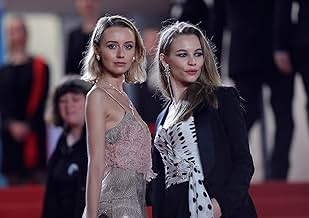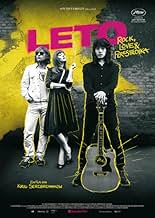AVALIAÇÃO DA IMDb
7,3/10
8,3 mil
SUA AVALIAÇÃO
Um triângulo amoroso surge entre um músico de rock and roll, o seu protegido e a sua esposa na Rússia dos anos 80.Um triângulo amoroso surge entre um músico de rock and roll, o seu protegido e a sua esposa na Rússia dos anos 80.Um triângulo amoroso surge entre um músico de rock and roll, o seu protegido e a sua esposa na Rússia dos anos 80.
- Direção
- Roteiristas
- Artistas
- Prêmios
- 14 vitórias e 29 indicações no total
Roman Bilyk
- Mike
- (as Roma Zver)
Ksenia Plyusnina
- Ksusha
- (as Ksenia Plusnina)
Avaliações em destaque
10Wes_Dean
Leto is one of these rare movies that know how to talk to your heart, to open it up and awaken all the dreams you ever thought of. Leto is a little jewel, the one in which resides such powerful, impacting strength but also a beauty that you can only admire.
The movie puts us in the underground rock scene of late Soviet Union. It sets itself in a climate where change is asked but also felt, the times of the Perestroika. But yet control over culture is really strong. The way youth wants to express itself, by the music they listen to and make (music inspired in many occidental rock groups) is only limited to abandoned warehouses where access is restricted, under control of the regime's police. This creative climate is always contained, but never feels oppressive for the viewer nor for the characters that actually act with great liberty. And this is particularly thanks to Serebrennikov's directing. He uses all cinema's artifices, pushes the limits of staging to create his own universe. The black and white creates an atmosphere of such simplicity, yet full of possibilities. The adopted view expresses how all the characters and all the legends that forged this period were great dreamers at core. They had dreams, they dream all along, they tried to transmit their dreams in the frame that was imposed to them. They created a new vision, a new world. The power of youth for change is one of the great motors of this movie. But the real beauty is that the movie never falls in a pamphletarian tone, it always stays with this optimist vision that awakens the dreamer in each one of us, and encourages everyone to pursue their dreams. Although it's dealing with past, Serebrennikov's tale is still really relevant in our time, where we all absolutely need to dream and need to fulfill our dreams to escape this anxiogenous climate that reigns in our society. The movie warms your heart, gives you power and energy for change -whatever type of change it is- and that's where resides all the greatness of the movie; it is a source of light that will reheat your heart, and give you hope.
That's why I am still scandalized that it didn't win a single prize in Cannes when it is one of the movies that was really worth winning a distinction. It would of been the occasion of giving a great impulse to this creative, crazy and ambitious cinema, that throws traditional codes away and finally dares to brake rules ! It would of been the occasion to recognize the talent and vision of Serebrennikov that is, we all know, put at risk by elements that he cannot control.
So go, run to watch this hymn to youth, revolution, change, beauty and dream !
The movie puts us in the underground rock scene of late Soviet Union. It sets itself in a climate where change is asked but also felt, the times of the Perestroika. But yet control over culture is really strong. The way youth wants to express itself, by the music they listen to and make (music inspired in many occidental rock groups) is only limited to abandoned warehouses where access is restricted, under control of the regime's police. This creative climate is always contained, but never feels oppressive for the viewer nor for the characters that actually act with great liberty. And this is particularly thanks to Serebrennikov's directing. He uses all cinema's artifices, pushes the limits of staging to create his own universe. The black and white creates an atmosphere of such simplicity, yet full of possibilities. The adopted view expresses how all the characters and all the legends that forged this period were great dreamers at core. They had dreams, they dream all along, they tried to transmit their dreams in the frame that was imposed to them. They created a new vision, a new world. The power of youth for change is one of the great motors of this movie. But the real beauty is that the movie never falls in a pamphletarian tone, it always stays with this optimist vision that awakens the dreamer in each one of us, and encourages everyone to pursue their dreams. Although it's dealing with past, Serebrennikov's tale is still really relevant in our time, where we all absolutely need to dream and need to fulfill our dreams to escape this anxiogenous climate that reigns in our society. The movie warms your heart, gives you power and energy for change -whatever type of change it is- and that's where resides all the greatness of the movie; it is a source of light that will reheat your heart, and give you hope.
That's why I am still scandalized that it didn't win a single prize in Cannes when it is one of the movies that was really worth winning a distinction. It would of been the occasion of giving a great impulse to this creative, crazy and ambitious cinema, that throws traditional codes away and finally dares to brake rules ! It would of been the occasion to recognize the talent and vision of Serebrennikov that is, we all know, put at risk by elements that he cannot control.
So go, run to watch this hymn to youth, revolution, change, beauty and dream !
So, as I'm a dumb plebe, I don't check at TV and YouTube, I missed this awesome picture that was released 2 months ago, and I've only recently got a glimpse of the bomb.
Firstly, I want to tell you, that this picture is included in my specialty top 5 movies of the year, and here is a reason.
Words do not convey how much is it full of wonderful camerawork moves, musical accompaniment and acting, the general atmosphere and her cultural significance.
It is important to understand the point that this film is positioned as a requiem for Victor Tsoy and Mike Naumenko, but, for me, this picture is better perceived as artistic, because of its historical fidelity.
Not to make spoilers, let me just say that it's a cool pseudo documentary about the punk / avant-garde get-together of the capital of all Russian-speaking cherry-pickings, namely "Leningrad Rock Club" and its beginnings.
The other one is worth seeing, isn't it?
Separately, I want to note the soundtrack, which took first place in Cannes, which is not surprising.
How the hell can one not win with the overdose of such monsters as Bowie, Lou Reed, Blondie, T-Rex, Talking Heads, Iggy Pop and many more.
Which is only worth the presence in the movie Shortparis, from which I, as always, caught a real aesthetic orgasm.
Inserts with musicals, b/w and enduring the spirit of that era in the complex fascinating viewing experience.
To sumbit I can only say, watch online, go to the cinema, but do not miss this movie with your interested eyes.
I've not posted for a while, life taking a huge dip lately and i've been busy with other stuff. No idea what to start with, i had been listening to bands from the Eastern bloc. Then switched to Thrash metal and listened to Shah's Beware album (1989) and E. S. T. Electro Shock Therapy (1989). I was going back and forth and played classic rock bands from the Soviet. I remembered Serebrennikov's movie but was not able to recollect the name. I looked it up and it put me in a good zone after all the music, I watched it twice!
The movie is a portrait of Leningrad's underground music scene of the early 1980s - shot in moody monochrome, loosely based on Kino frontman Viktor Tsoi ( the Marc Bolan of Russia back in those days) with an interesting story of keeping the flame alive in the declining scene (who would not like to know what was being a rock star in the Soviet Union in the 80's ?) It is beautifully shot, a perfect ode to the youth and rock in Soviet Russia, which also contains the immortal line: "This is Natasha, she really loves tomatoes". Kirill Serebrennikov has put his sweat, blood and tears and completed the project while he was under house arrest and it triggered backlash from the public when he was denied permission to attend the cremation of his mother by the court.
I would definitely say that I'm a big fan of Serebrennikov films and his vision for Leto is so passionate and poetic that you feel you're part of the era amidst the turmoil and what it really felt like listening to rock music in the 80s featuring music by T-Rex, Talking Heads, Iggy Pop, Lou Reed, Bowie, Blondie & more. There are filmmakers who have contributed to this genre, but Serebrennikov is one of the handful to have succeeded in this initiative of linking music to political protest.
The movie is a portrait of Leningrad's underground music scene of the early 1980s - shot in moody monochrome, loosely based on Kino frontman Viktor Tsoi ( the Marc Bolan of Russia back in those days) with an interesting story of keeping the flame alive in the declining scene (who would not like to know what was being a rock star in the Soviet Union in the 80's ?) It is beautifully shot, a perfect ode to the youth and rock in Soviet Russia, which also contains the immortal line: "This is Natasha, she really loves tomatoes". Kirill Serebrennikov has put his sweat, blood and tears and completed the project while he was under house arrest and it triggered backlash from the public when he was denied permission to attend the cremation of his mother by the court.
I would definitely say that I'm a big fan of Serebrennikov films and his vision for Leto is so passionate and poetic that you feel you're part of the era amidst the turmoil and what it really felt like listening to rock music in the 80s featuring music by T-Rex, Talking Heads, Iggy Pop, Lou Reed, Bowie, Blondie & more. There are filmmakers who have contributed to this genre, but Serebrennikov is one of the handful to have succeeded in this initiative of linking music to political protest.
This film is nothing short of an electrifying experience.
I was skeptic to begin with. This, I can tell you right off the bat, was a huge mistake. When the actual film started, I immediately forgot about anything outside the screen. It was like a time travel deluxe package. I speak as someone who is a half European, half Russian Gen Z. I never experienced the Soviet era on first hand, but the night I went to watch this film, I forgot the current year. They're writing 2019 now, you say...? Ha ha, but really. Intense and during certain points in the film, I even got chills.
If you've ever heard about "breaking the 4th wall" as a filmography term, well, get excited because this is exactly what happens a lot. The end result is that you feel like you physically *are* present, and thus incredibly difficult for you to not feel connected in some manner.
The special effects are incredible, and the relationship between black and white/colour splashes in the film is something I've hardly ever seen before. This is fantastic.
One of the points about the film which made me skeptic to begin with was the "love triangle" ordeal in the bio. "Love triangle"? I thought. "Oh my, this has been done to death already!" I was fearing Twilight-esque cliché onto cliché, but nothing like it was to be found at all. It felt humane and raw... original. Not cliché.
If you have Russian roots somehow or have studied Russian, it's hard not to enjoy this film. If you've been in the Soviet regime yourself, you might get very touched/cry because as I mentioned, strong time travel feeling in here. If you're a Russian-rooted millennial or Gen Z, there is a huge potential for you to learn a lot and feel connected to the past of Russia.
I certainly felt connected and impressed. Should you folks happen to have any second thoughts or reservations about watching this, I tell you to just let go of them because the experience is incredible. Worth my every penny :)
I was skeptic to begin with. This, I can tell you right off the bat, was a huge mistake. When the actual film started, I immediately forgot about anything outside the screen. It was like a time travel deluxe package. I speak as someone who is a half European, half Russian Gen Z. I never experienced the Soviet era on first hand, but the night I went to watch this film, I forgot the current year. They're writing 2019 now, you say...? Ha ha, but really. Intense and during certain points in the film, I even got chills.
If you've ever heard about "breaking the 4th wall" as a filmography term, well, get excited because this is exactly what happens a lot. The end result is that you feel like you physically *are* present, and thus incredibly difficult for you to not feel connected in some manner.
The special effects are incredible, and the relationship between black and white/colour splashes in the film is something I've hardly ever seen before. This is fantastic.
One of the points about the film which made me skeptic to begin with was the "love triangle" ordeal in the bio. "Love triangle"? I thought. "Oh my, this has been done to death already!" I was fearing Twilight-esque cliché onto cliché, but nothing like it was to be found at all. It felt humane and raw... original. Not cliché.
If you have Russian roots somehow or have studied Russian, it's hard not to enjoy this film. If you've been in the Soviet regime yourself, you might get very touched/cry because as I mentioned, strong time travel feeling in here. If you're a Russian-rooted millennial or Gen Z, there is a huge potential for you to learn a lot and feel connected to the past of Russia.
I certainly felt connected and impressed. Should you folks happen to have any second thoughts or reservations about watching this, I tell you to just let go of them because the experience is incredible. Worth my every penny :)
Biopic/romance about a love triangle between singer-songwriter Mike Naumenko (founding member of Zoopark) that was one of the founding groups in the Russian rock movement, his wife Natalia 'Natasha' Naumenko, and his protege Viktor Tsoy (singer-songwriter who co-founded Kino, one of the most popular and musically influential bands in the history of Russian rock music).
Based on the memoir of Natasha Naumenko and filmed in B&W, this is a riveting, lyrical movie that provides a window into ordinary Soviet life in the early 1980s. Not nearly as totalitarian as we in the USA are normally led to believe, but with subtle elements throughout that let us see they are by no means a completely free society.
Great music weaves its way thought the film, both by Zoopark and Kino, as well as many references to western artists who are their influences (Sex Pistols, Bowie, T-Rex, Lou Reed, The Beatles, etc.)
At several points the film shifts into non-sequitur music videos of western songs (like Lou Reed's 'Perfect Day') at the end of which one of the characters would have a sign saying (in Russian) "This did not really happen"...
Overall a fascinating movie, highly recommended for people who love music, especially if you'd like an introduction to some Soviet rock, which I was previously unfamiliar with.
Você sabia?
- CuriosidadesBesides Victor Tsoy and Mayk Naumenko, several characters known only by their first names or nicknames are stand-ins for real musicians, popular in the Soviet rock scene. In 1980's Leonid (Filipp Avdeyev) represents Aleksey Rybin of 'Kino' fame. 'Punk' is a stand-in for Andrey 'Svin' Panov (Aleksandr Gorchilin), leader of 'Avtomaticheskiye ydovletvoreniye' punk band and one of the pioneers of punk genre in USSR. Bob (Nikita Efremov) is Boris Grebenshchikov, leader of rock band 'Akvarium' and Artyom (Andrey Khodorchenkov) represents Artemiy Troitskiy, pioneer of rock music in USSR and organizer of multiple rock concerts and festivals.
- Cenas durante ou pós-créditosThe title card before the end credits roll is Russian for "This film is dedicated to those we love"
- ConexõesReferenced in Vecherniy Urgant: Denis Klyaver/Vyacheslav Kuznetsov/Stanislav Tsapaev (2018)
- Trilhas sonorasDryan'
Written by Mikhail Naumenko
Performed by Zveri: Roman Bilyk (vocals), German Osipov (guitars), Kirill Afonin (bass),Valentin Tarasov (drums), Vyacheslav Zarubov (keyboards)
Principais escolhas
Faça login para avaliar e ver a lista de recomendações personalizadas
- How long is Leto?Fornecido pela Alexa
Detalhes
- Data de lançamento
- Países de origem
- Centrais de atendimento oficiais
- Idiomas
- Também conhecido como
- Leto
- Locações de filme
- Saint Petersburg, Rússia(setting of the action)
- Empresas de produção
- Consulte mais créditos da empresa na IMDbPro
Bilheteria
- Faturamento bruto mundial
- US$ 3.073.293
- Tempo de duração2 horas 6 minutos
- Cor
- Proporção
- 2.39 : 1
Contribua para esta página
Sugerir uma alteração ou adicionar conteúdo ausente



















